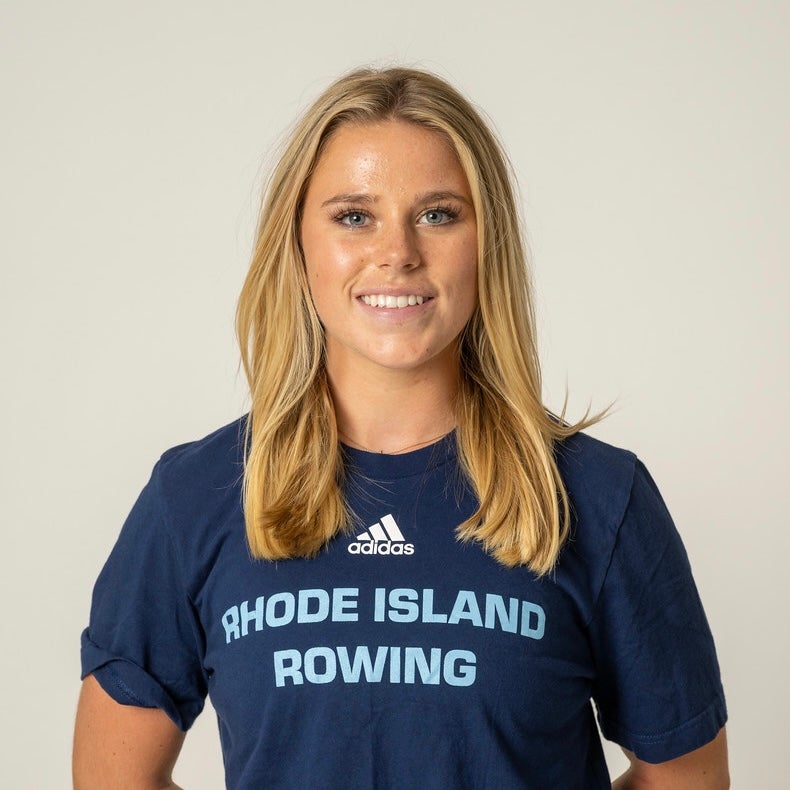Last summer, Nicole Jones, a senior data science major, was among five members of the URI women’s rowing team honored as Collegiate Rowing Coaches Association 2023 National Scholar-Athletes.
The honor is reserved for student-athletes in their second, third or fourth year of eligibility who competed in at least 75 percent of their team’s spring races while also maintaining a 3.5 cumulative GPA or higher. While maintaining her high performance in the classroom, Jones played a key role in helping the Rams place second at the Atlantic 10 Championship in May.
We spoke with Jones about what it’s like to be a student-athlete studying data science at URI.
What drew you to data science as a major?
What initially drew me to data science was my strong affinity for math. However, my interest solidified in my late sophomore year when I realized that data science could provide statistical insights through computer-based analysis, rather than by hand. The idea of integrating data science into sports, whether through technology or analysis, also intrigued me. Additionally, as a business innovation and entrepreneurship major, I recognized that data science’s role in technological innovation was essential for shaping a progressive future, which I wanted to be a part of.
What has the experience of being a student athlete at URI been like?
My experience as a student-athlete at URI on the women’s rowing team has been a transformative journey. Choosing URI was about finding the right blend of competition and camaraderie that would push me both athletically, academically, and personally.
Balancing academics and athletics has taught me to give my all in each moment, whether I’m on the water, in class, or with loved ones, and becoming a team captain my junior year was a proud moment to reflect my dedication to following those guidelines and the two championships that came with. This approach emphasized the importance of being fully present.
Being a student-athlete highlights the value of teamwork, whether with my rowing crew, friends, family, or the athletic department. Collaboration has proven to be the key to staying on track and achieving my goals whether with my teammates, co-captains, classmates, friends, or family. Overall, being a URI student-athlete has taught me about commitment and the power of presence. It has been challenging, but more so rewarding when it leads to balance and success for me and my team.
Have you applied any data analysis to your athletic performance (or that of others)?
During my time as a sports science intern, I had the unique opportunity to bridge my passion for athletics with data analysis. As part of the role, I implemented advanced data analytics techniques to track and enhance athlete performance. I collected and analyzed key performance indicators (KPIs) such as vertical jump and sprint times, leveraging data visualization tools to create dynamic dashboards for individual and team progress. This experience not only reinforced the value of data-driven insights in optimizing athletic performance but also inspired me to apply similar analytical approaches to my personal training routines, helping me make informed adjustments for better results.
I will be doing an honors project this school year and will be combining my entrepreneurial drive with my love for athletics to create a Sports Science venture. I’ve harnessed data analysis to enhance athletic performance by developing a comprehensive sports database. This database fuels athlete dashboards and leaderboards, giving coaches and athletes actionable insights. I will be integrating these into my team as well to benefit from data analysis firsthand. Additionally, I’m exploring wearable technology to gather real-time data during training, aiming to create a live dashboard that monitors heart rates and detects health risks. This project showcases how data analysis can transform athletic performance and underscores my commitment to innovative solutions in sports science.
What advice would you give someone thinking about data science as a major?
If someone is considering data science as a major, I’d offer a few insights based on my own journey. One of the most rewarding aspects is being able to translate data into understandable insights for those outside the tech realm. It’s a skill that sets me apart, so making sure as much as someone learns, still being able to communicate it simply is very important. My combination of data science and business majors has allowed me to apply data principles to real-world problems, driving innovation and opening doors, so the advice I would give would be to cross data science with another passion. Innovation happens when your passions converge and there is data in every industry, so finding one you care about and applying what you have learned to it sets you apart.

